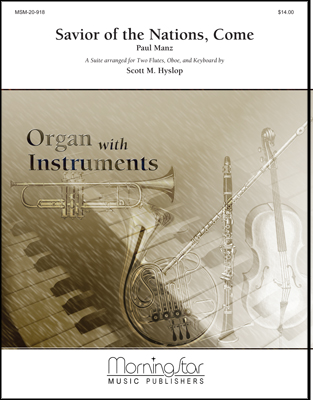- |
User Links
Savior of the Heathen, Known

Savior of the heathen, come
Author: Ambrose of Milan; Translator (from German to English): Richard Massie; Translator (from Latin to German): Martin LutherPublished in 6 hymnals
Printable scores: PDF, MusicXMLAudio files: MIDI
Representative Text
1 Savior of the heathen, come,
Virgin's Son, here make Thy home;
Wonder at it, heaven and earth,
That the Lord chose such a birth.
2 Not by human flesh and blood,
By the Spirit of our God
Was the Word of God made flesh--
Woman's blossom, sweet and fresh.
3 Though the virgin was with child,
Chastity proved undefiled;
Many a virtue rare forth shone,
God was there upon His throne.
4 From the Father forth He came,
And returned unto the same,
Down to hell He went alone,
And again to God's high throne.
5 Thou, the Father’s equal, win
Victory in the flesh o’er sin,
By Thy strength divine, O Lord,
Help to our frail flesh afford.
6 Lord, Thy manger is so bright,
Night sends forth a novel light;
Darkness must not enter there,
Faith abides in light fore'er.
7 Praise be God the Father sing,
Praise to God the Son, our King,
Praise to God the Spirit be
Ever and eternally.
Source: Evangelical Lutheran Hymn-book #141
Author: Ambrose of Milan
 Ambrose (b. Treves, Germany, 340; d. Milan, Italy, 397), one of the great Latin church fathers, is remembered best for his preaching, his struggle against the Arian heresy, and his introduction of metrical and antiphonal singing into the Western church. Ambrose was trained in legal studies and distinguished himself in a civic career, becoming a consul in Northern Italy. When the bishop of Milan, an Arian, died in 374, the people demanded that Ambrose, who was not ordained or even baptized, become the bishop. He was promptly baptized and ordained, and he remained bishop of Milan until his death. Ambrose successfully resisted the Arian heresy and the attempts of the Roman emperors to dominate the church. His most famous convert and disciple w… Go to person page >
Ambrose (b. Treves, Germany, 340; d. Milan, Italy, 397), one of the great Latin church fathers, is remembered best for his preaching, his struggle against the Arian heresy, and his introduction of metrical and antiphonal singing into the Western church. Ambrose was trained in legal studies and distinguished himself in a civic career, becoming a consul in Northern Italy. When the bishop of Milan, an Arian, died in 374, the people demanded that Ambrose, who was not ordained or even baptized, become the bishop. He was promptly baptized and ordained, and he remained bishop of Milan until his death. Ambrose successfully resisted the Arian heresy and the attempts of the Roman emperors to dominate the church. His most famous convert and disciple w… Go to person page >Translator (from German to English): Richard Massie
Massie, Richard, eldest son of the Rev. R. Massie, of Goddington, Cheshire, and Rector of Eccleston, was born at Chester, June 18, 1800, and resides at Pulford Hall, Coddington. Mr. Massie published a translation of Martin Luther’s Spiritual Songs, London, 1854. His Lyra Domestica, 1st series, London, 1860, contains translations of the 1st Series of Spitta's Psalter und Harfe. In 1864 he published vol. ii., containing translations of Spitta's 2nd Series, together with an Appendix of translations of German hymns by various authors. He also contributed many translations of German hymns to Mercer's Church Psalter & Hymn Book; to Reid's British Herald; to the Day of Rest, &c. He died Mar. 11,1887. -- John Julian, Di… Go to person page >Translator (from Latin to German): Martin Luther
 Luther, Martin, born at Eisleben, Nov. 10, 1483; entered the University of Erfurt, 1501 (B.A. 1502, M.A.. 1503); became an Augustinian monk, 1505; ordained priest, 1507; appointed Professor at the University of Wittenberg, 1508, and in 1512 D.D.; published his 95 Theses, 1517; and burnt the Papal Bull which had condemned them, 1520; attended the Diet of Worms, 1521; translated the Bible into German, 1521-34; and died at Eisleben, Feb. 18, 1546. The details of his life and of his work as a reformer are accessible to English readers in a great variety of forms. Luther had a huge influence on German hymnody.
i. Hymn Books.
1. Ellich cristlich lider Lobgesang un Psalm. Wittenberg, 1524. [Hamburg Library.] This contains 8 German h… Go to person page >
Luther, Martin, born at Eisleben, Nov. 10, 1483; entered the University of Erfurt, 1501 (B.A. 1502, M.A.. 1503); became an Augustinian monk, 1505; ordained priest, 1507; appointed Professor at the University of Wittenberg, 1508, and in 1512 D.D.; published his 95 Theses, 1517; and burnt the Papal Bull which had condemned them, 1520; attended the Diet of Worms, 1521; translated the Bible into German, 1521-34; and died at Eisleben, Feb. 18, 1546. The details of his life and of his work as a reformer are accessible to English readers in a great variety of forms. Luther had a huge influence on German hymnody.
i. Hymn Books.
1. Ellich cristlich lider Lobgesang un Psalm. Wittenberg, 1524. [Hamburg Library.] This contains 8 German h… Go to person page >Text Information
| First Line: | Savior of the heathen, come |
| Title: | Savior of the Heathen, Known |
| German Title: | Nun komm der heiden heiland |
| Author: | Ambrose of Milan |
| Translator (from German to English): | Richard Massie |
| Translator (from Latin to German): | Martin Luther |
| Meter: | 7.7.7.7 |
| Language: | English |
| Copyright: | Public Domain |
English
- Evangelical Lutheran Hymn Book with Tunes #d384
- Evangelical Lutheran Hymn-book #141
- Evangelical Lutheran Hymn-book #36
- Evangelical Lutheran Hymnbook (Lutheran Conference of Missouri and Other States) #d290
- The Christmas Song Book: containing Forty of the Best christmas Songs #38
- The Cyber Hymnal #5912
German
Tune
NUN KOMM, DER HEIDEN HEILANDNUN KOMM DER HEIDEN HEILAND is a chorale derived from a chant. Among the simplest of the Lutheran repertoire, it is framed by identical lines–l and 4. Sing the entire hymn with antiphonal groups (the practice its original Latin author, Ambrose, strongly promoted). Sing some stanzas in unison and o…
[Nun komm, der Heiden Heiland] (15671)
Timeline
Arrangements
Piano/OrganMore Piano/Organ... |  |
ChoralMore Choral... |  |
InstrumentalMore Instrumental... |  |
HandbellsMore Handbells... |  |


 My Starred Hymns
My Starred Hymns


